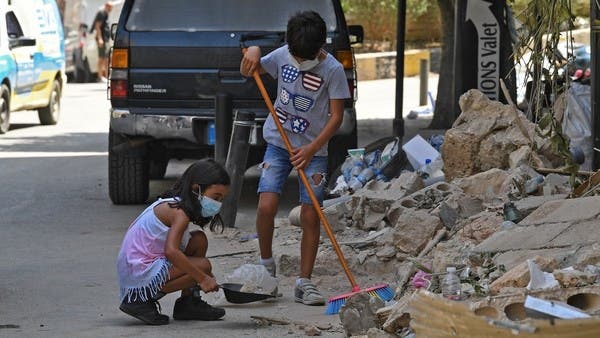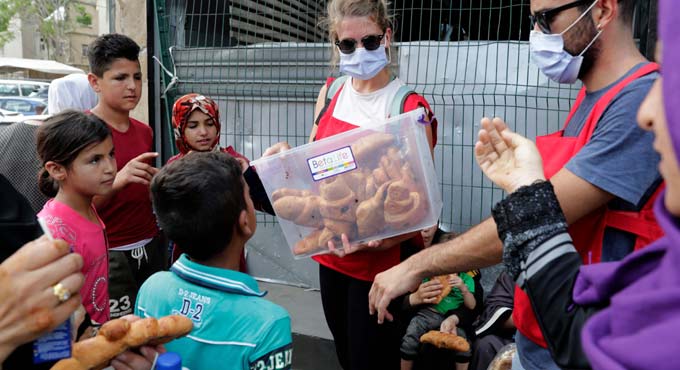"Blood, blood. Glass. Why is there glass? Loud noise!!"

Lebanese children clean debris in Beirut's Gemmayzeh neighborhood on after a monster explosion killed more than 150 people and disfigured the Lebanese capital. /AFP
Lebanese children clean debris in Beirut's Gemmayzeh neighborhood on after a monster explosion killed more than 150 people and disfigured the Lebanese capital. /AFP
Those were the first words 3-year-old Hamoudi uttered after three days of silence.
Hamoudi was with his grandmother, aunt and mom at their local supermarket when nearly 3,000 tonnes of ammonium nitrate exploded in Beirut's port on August 4.
The blast blew bottles and cans from the supermarket shelves, shattered the pane glass windows at the store entrance and pried doors from their hinges.
Hamoudi's aunt snatched him from his stroller and ran sobbing and praying to the street outside. Glass from surrounding shattered windows crunched beneath her feet as she ran past dazed, blood-drenched locals.
Hours later, in the relative safety of their family home, Hamoudi was silent.
"His eyes were huge. Like big plates. He didn't talk. I tried to get him to say something but he wouldn't speak," his mother Sariya recounts.
Hamoudi was catatonic during waking hours and somnambulant at night. A phone call with his grandmother opened the flood gates.
"He cried as he shared with his grandmother. 'I'm afraid. Why was there a bad noise? Why was there blood?'"

Lebanese volunteers distribute food in the Karantina neighborhood near Beirut's port. /AFP
Lebanese volunteers distribute food in the Karantina neighborhood near Beirut's port. /AFP
Hamoudi's symptoms are characteristic of a range of trauma manifestations Beirut's children are exhibiting.
"Nightmares, bed-wetting, regression, aggression, extreme attachment to a parental figure - we're seeing the entire range," child psychologist and intervention specialist Layal Otabashi explains. "Lebanon's children were already dealing with the effects of COVID-19 lockdown - no school or structure, cut-off from play and routine…And there's economic instability which affects their parents, in turn affecting the children.”
Trauma and children: Lebanon's future
The multiple layers of calamity thrust upon Lebanon's young people will impact the future generation of adults.
"If they are able to get the therapy and psychological support they need, overcoming the hurdles is possible. If not, the implications of mental health damage are clear," Layal Otabashi elucidates.
Of the 6,000 people injured in the August 4 blast, 1,000 were children. Hundreds of thousands of Lebanese thrown into homelessness by the explosion include 30,000 children.
Hamoudi is no longer exhibiting the second stage post-trauma symptoms that manifested in the immediate aftermath of the blast. Psychologists warn: Outward appearances may mask deeper, inner trauma.
(Cover image: Hiba Achi hugs her son, three-year-old Abed Achi, at her house in Beirut, Lebanon, August 11, 2020. /AP)